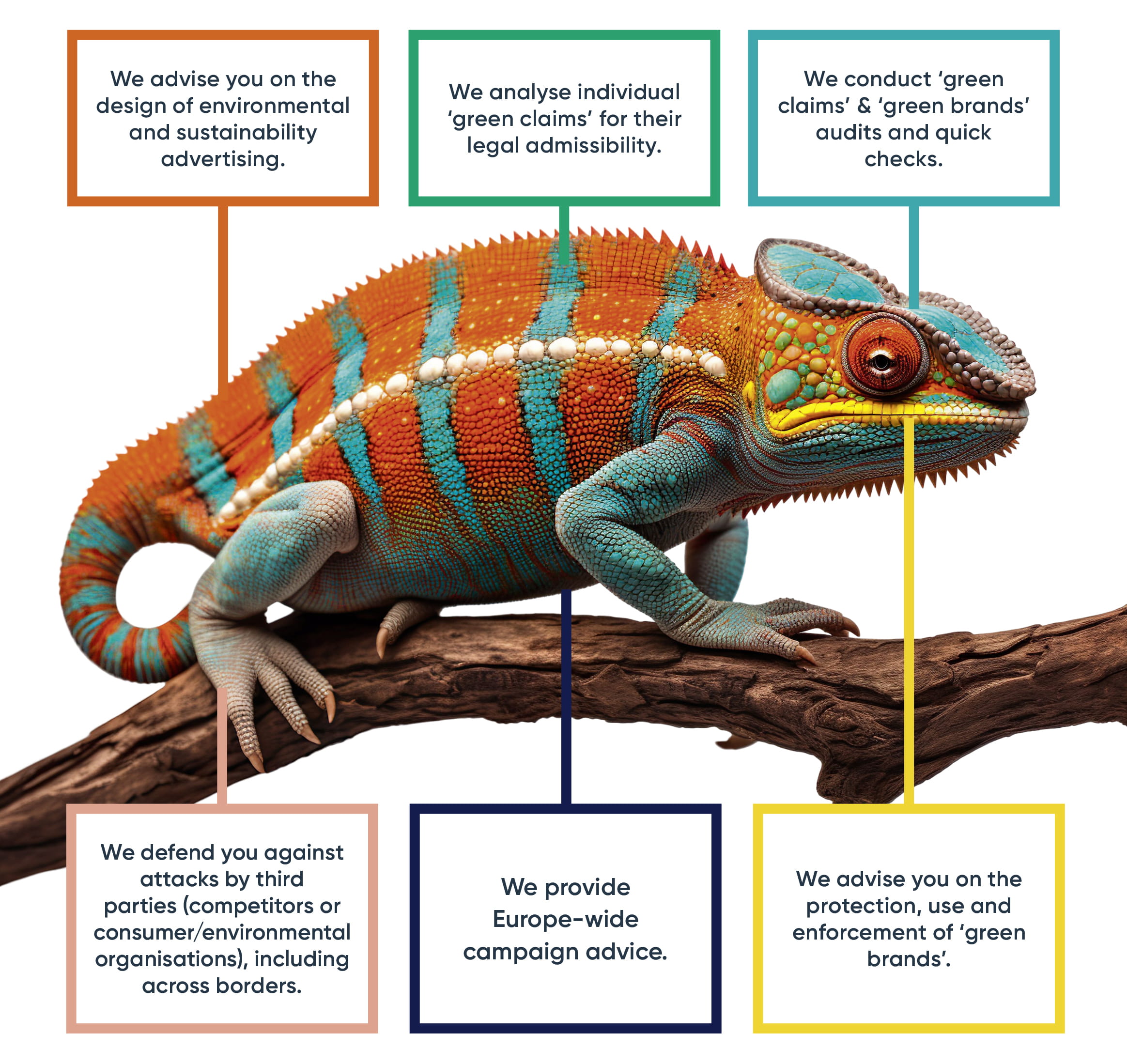- 在此页面上
Environmental protection and sustainability are key themes in corporate communications when it comes to green advertising. As brands strive to highlight their 'green' credentials, it becomes essential to ensure that environmental claims are accurate, evidence-based, and regulatory compliant to avoid misleading consumers.
Governments need to encourage consumers and businesses to be greener if countries are to meet their environmental targets, and consumers are increasingly looking for 'greener' credentials when making purchasing decisions.
This has not been lost on marketers. 'Green', 'sustainable', 'natural', 'carbon neutral', 'eco', 'organic', 'recycled', 'recyclable', 'biodegradable', 'low emission', 'plastic-free', 'without harming your world' and 'helping to save the planet' are just some of the terms increasingly used to attract consumers interested in environmentally friendly products and services. But how meaningful are these claims and what should consumers make of them?
While many brands use these terms with genuine credibility, others have been accused of 'greenwashing' or 'green sheening' – ie making unfounded or deceptive green claims to persuade consumers to buy their products or services. We can help to minimise the risk of regulatory scrutiny.
What's it all about?
An important part of ESG activities, and the marketing efforts of many companies, is providing information on whether the company's products, and the company itself, are sustainable. Such information typically includes classic ‘green claims’, but can also extend to things such as ‘green brands’, which have come to play an increasingly important role in the brand strategy of many companies.
Greenwashing and ‘climate neutrality’ concerns are also the focus of action or complaints from consumer associations and have already led to numerous court decisions – most to the detriment of advertising companies and their brands. Our guide maps out the numerous regulations in various jurisdictions and the 'case law jungle' to show the safe and permissible ways of engaging in advertising that focuses on sustainability and environmental protection statements.
Which regulations apply?

Advertising and marketing are highly regulated in the United Kingdom (UK). The landscape in relation to green claims is a mixture of general laws and self-regulatory codes, primarily aimed at prohibiting misleading and harmful claims, supplemented by sector- and product-specific legislation and rules.
The laws extend to both business-to-consumer and business-to-business contexts and cover a broad range of advertising (traditional and online) and marketing settings. Breaches of the legislation can lead to criminal as well as civil sanctions, although the former are relatively rare.
The powers of the Competition and Markets Authority (CMA), a key regulator, will be significantly bolstered when the new Digital Markets, Competition and Consumers Act 2024 is implemented (expected April 2025), which will allow it to take direct enforcement action (including imposing fines) for certain breaches without the need to go to court.
There is an extensive amount of guidance on how to get green claims right in the UK. Green claims can be made, but they must be supported by evidence and be specific.

Green advertising is mainly covered by general unfair competition law and, more specifically, by the prohibition of misleading advertising. As green claims tend to have a strong emotional effect, the Austrian courts apply a strict standard of review. If green claims come across as ambiguous to consumers, they must be supported with additional information.
There have not been a great number of cases regarding green advertising in Austria as of 2024. In the cases so far, the courts have emphasised the importance of providing consumers with a clear picture of the concrete steps taken to address the claims and the frame of reference the claims relate to. Given the recent ruling by the German Federal Court in case I ZR 98/23 (for further details, see the Germany tab), it is advisable for those in Austria to also ensure that general terms such as 'climate neutral' or 'sustainable' are explained within the same advertising medium as the term (ie, within the advertisement itself and not on a separate website).
Violations of the Austrian Unfair Competition Act can be pursued either by competitors or certain associations. Legal consequences can include cost- and time-intensive proceedings, often in combination with a preliminary injunction.
In the case of a loss, there is an obligation to reimburse the opponent’s legal costs, as well as an obligation to publish the judgement in a prescribed format (with the heading 'in the name of the Austrian Republic') in a medium where consumers will see, for example on the main page of the website covering at least a quarter of the screen space for 30 days (without a 'pop-up') and, in addition, in a national daily newspaper or on television.
Green trade marks may also be considered to be 'green claims' and thus may not be descriptive or pose a serious risk of misleading consumers in relation to the applied classes of goods. Violations may result in the trade mark being denied or cancelled at a later point.
The adopted EU Empowering Consumers Directive (Directive (EU) 2024/825) will put further restrictions on green advertising. Among others, it will only allow generic environmental claims such as 'green' or 'eco-friendly' if they are either explained within the same advertising medium or are based on certain environmental labels.
Claims relating to future environmental performance will have to be based on a detailed implementation plan including objective and verifiable time-based goals, a financing plan and regular verification by an independent third party. Claims relating to a product’s environmental performance based on offsetting greenhouse emissions will be prohibited (eg, 'this product is CO2 neutral').
The EU Green Claims Directive (Directive 2023/0085/COD), on its way to the trilogue negotiations in autumn 2024, will lay down strict standards for the communication and substantiation of explicit environmental claims (eg, 'we have reduced our water usage by 25% since 2020'). Furthermore, all explicit environmental claims will have to be pre-verified by a national conformity assessment body.
Violations of the EU Green Claims Directive will be sanctioned with high fines. However, having proper verification does not provide 'safe harbor' under unfair competition law. According to the present draft of the EU Green Claims Directive, the verification will not be binding on the courts.

Environmental credentials are now key considerations for consumers in their purchasing decisions and environmental claims are increasingly used by marketers when promoting their products and services. Under French laws, environmental claims are perfectly valid provided they are true, substantiated and allow consumers to make their choice on the basis of reliable information.
Greenwashing is not a new topic for the French legislator. The advertising sector and green claims are regulated by general laws, sectoral laws and regulations, in addition to self-regulatory codes and soft law provided by the French Advertising Standards Authority(Autorité de Régulation Professionnelle de la Publicité ARPP).
This regulation began in 2012 under the banner of the prohibition of unfair commercial practices: any green claim in an advertisement which is untrue, unclear, incomplete, exaggerated or not capable of substantiation will constitute misleading advertising.
In 2015, and in response to growing environmental awareness and the expansion of greenwashing, the Energy Transition for Green Growth Act (Loi relative à la transition énergétique pour la croissance verte) introduced an obligation that producers who intentionally make environmental claims in relation to a product or service must provide consumers with the corresponding main environmental characteristics of those claims.
Lastly, the 2020 Fight against Waste and for a Circular Economy Act (Loi relative à la lutte contre le gaspillage et à l'économie circulaire) and 2021 Climate and Resilience Act (Loi portant lutte contre le dérèglement climatique et renforcement de la résilience face à ses effets) reinforced the applicable legal framework against greenwashing, and corresponding sanctions, by introducing new provisions in the French Environment Code.
The EU’s Empowering Consumers Directive 'EmpCo' (Directive (EU) 2024/825) and the EU’s Green Claims Directive (Directive 2023/0085/COD) which is still being debated will also put further restrictions on green advertising when they are transposed into French law. It should be noted however that French laws already include most of their provisions.
The French self-regulatory advertising authority (the 'ARPP') has also provided detailed guidance on how to use green claims correctly in France and its rulings in relation to environmental claims across a variety of sectors provide some useful examples on what claims may fall under greenwashing.

You can find more detailed information on green advertising in Germany, including our German Green Claims Enforcement Tracker here.
In Germany, advertising with environmental (green) claims has become more and more common in recent years - there is hardly a product in supermarkets or drugstores that is not advertised in some way with a reference to its (positive) environmental effect. Even cruises and mineral oils are advertised with environmental claims.
Advertising with claims like ‘carbon neutral’, ‘climate neutral’ or ‘eco-friendly’ has become indispensable - just like the discussion about where reliable advertising with green claims ends and ‘greenwashing’ begins. There has hardly ever been any other topic related to competition law that has kept the German courts as busy in such a short period of time as environmental advertising using the claim ‘carbon neutral/climate neutral’.
Decisions of various regional and higher regional courts on this topic have been handed down in quick succession with sometimes very different outcomes (for detailed information on the extensive German case law see our Green Claims Enforcement Tracker).
German case law around green claims is still evolving on many issues. However, the rulings issued to date give advertisers in Germany a little more legal certainty. Since the end of 2023, at least, certain themes have emerged in the German courts. Moreover, in June 2024, the Federal Court of Justice ruled on an important issue at the highest court and provided some guidance on the interpretation and justification of the term ‘climate neutral’.
Advertising your company or products as ‘climate neutral’ in Germany nevertheless remains fraught with risks. In addition, companies should also keep an eye on the fact that the EU wants to put an end to the advertising of products as ‘climate neutral’ on the basis of compensation measures (such as the purchase of CO2 certificates).
Companies should also comply with the much-discussed EU legislation on green claims – the Empowering Consumers Directive 'EmpCo' (Directive (EU) 2024/825) and the Green Claims Directive (Directive 2023/0085/COD), with the former applying in Member States by 27 September 2026 at the latest.

Greenwashing is one of the hottest topics in advertising in the Netherlands at the moment. As consumers demand more sustainable goods and services, companies are keen to meet this demand and therefore market their goods and services as ‘green’ or ‘ecofriendly’.
This expanding practice of green labelling in the Netherlands has led to concerns and legal questions regarding the authenticity and legitimacy of these environmental claims, ie if the claims concerned are based on facts and can be sufficiently substantiated with relevant evidence.
Greenwashing, often defined as the practice of making false, misleading or unsubstantiated claims about environmental benefits or upsides of certain goods and services, has become a significant topic in Dutch advertising practice and in related legal matters. To address the increasing issue of greenwashing, the Netherlands has recently implemented additional rules to its already existing extensive regulatory framework that specifically target this type of advertising.
What to expect from EU legislation
As part of its ‘Green Deal’, the EU has issued two new directives that establish strict, uniform standards throughout the EU on information requirements and the verifiability of environmental advertising and 'green claims'. The Empowering Consumers Directive (EmpCo) (Directive (EU) 2024/825) has already come into force and its requirements will have to be observed in all EU Member States by September 2026. The EmpCo Directive significantly tightens the requirements for environmental advertising. Together with the Green Claims Directive (Directive 2023/0085/COD), the draft of which is still being discussed, the pressure is building for ‘greenwashers’. Both Directives will have far-reaching consequences for all companies that advertise themselves, their brands or their products as being sustainable.
Status
Entered into force on 26 March 2024.
Content and objectives
With this directive, the EU Parliament wants to protect consumers from misleading marketing practices in the area of sustainability advertising and thus enable a more transparent purchasing decision. In the future, companies will be subject to strict requirements regarding the use of environmental claims and the use of self-developed sustainability labels will be curbed. The regulations of the EmpCo Directive are only one component of the European Green Deal and are flanked by the Green Claims Directive.
Who's impacted?
Every advertising company.
Duties
No direct obligations for companies, but:
- prohibition of advertising with generic environmental claims
- ban on product-related climate-neutral, climate-reduced or climate-positive advertising based on the offsetting of greenhouse gas emissions
- regulation of advertising with sustainability labels (ie requirement of a third-party certification scheme)
- extensive obligations to provide evidence to support environmental claims.
Legal consequences of violations
As the directive will be implemented in national laws, the consequences are determined by the respective national regulations. Depending on the Member State, there is a danger of warning letters and/or preliminary injunctions via:
- cease and desist order
- obligation to provide information
- financial compensation

Status
In co-ordination. Could come into force from 2025.
Content and objectives
The Green Claims Directive will regulate the substantiation and communication of environmental advertising against greenwashing. It contains definitions such as 'environmental label', 'environmental performance', 'environmental aspect' and 'environmental impact' and should contain special regulations (ie 'lex specialis') in addition to the Unfair Commercial Practices (UCP) Directive, such as:
- minimum requirements for voluntary environmental claims (substantiation and communication)
- requirements for environmental labels and environmental labelling schemes
- verification procedures for environmental claims and environmental labels by independent, accredited test centres
- stricter sanctions for violations, including fines and confiscation of products or proceeds from the transactions.
The Green Claims Directive is intended to supplement the EmpCo Directive. A proposal was adopted by the EU Parliament on 12 March 2024 and is now being negotiated.
Who's impacted?
- Every advertising company with the exception of micro-enterprises (ie 10 employees or less, and an annual turnover of less than EUR2 million).
- SMEs (fewer than 250 employees and up to EUR50 million annual turnover) are to be given an additional year to implement the new regulations.
Duties
No direct obligations for companies, but:
- extensive obligations to provide evidence (both internally and in external communications) for advertising with explicit environmental claims
- pre-certification for the use of environmental claims (green claims)
- ex-post control by the authority to be set up.I
Note: details of the related duties are currently unclear as the draft is still under consultation and changes are expected.
Legal consequences of violations
- Under the proposal, Member States shall lay down the rules on penalties applicable to infringements. Penalties can include exclusion from public procurement and fines.

Our offering

Please rotate your mobile phone for a better view!
Latest news & insights

Where is the Green Claims Directive heading now that the Empowering Consumers for the Green Transition Directive is just around the corner?
作者

German Environment Agency (Umweltbundesamt, UBA) prohibits German long-distance bus company from advertising in Belgium with the terms “climate-friendly” and “environmentally neutral”






























